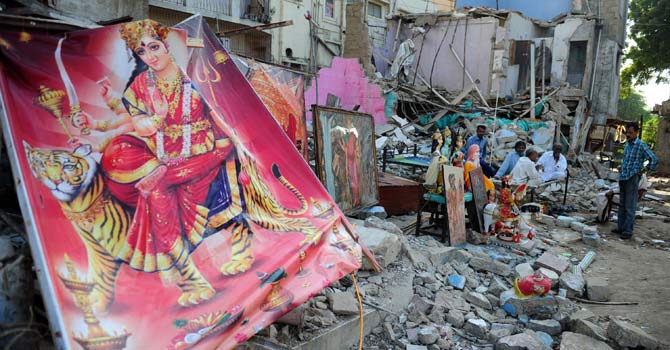In another blatant show of hostility towards minorities, Pakistan reportedly destroyed another revered Hindu temple in the city of Mithi in Sindh Province. The authorities in the Tharparkar District cited a court order to carry out the destruction of a Hinglaj Mata Mandir (Durga Temple) and a prominent Shakti Peeth.
But it was not the temple that fell victim to Pakistan’s intolerance for religious minorities. According to a report by an international media agency, Pakistan also carried out the demolition of a part of the Sharda Peeth Mandir near the LoC (Line of Control), which is the de facto border between India and Pakistan.
Shockingly, the demolition was given the green light even though a standing Supreme Court Order prohibited it. The demolition was reportedly carried out to make way for a coffee house, which is scheduled to be inaugurated later this month.
Previous Instances
Earlier in July 2023, another Hindu Temple was demolished in the Islamic Country after being declared an old and dangerous structure. The Mari Mata temple in Karachi’s Soldier Bazar was razed to the ground with the help of bulldozers in the presence of a heavy contingent of Pakistan Police. The temple was built 150 years ago and covered some 400-500 Square yards in the area. The land of the temple had been the target of land grabbers and developers for quite some time.
Karachi is home to various ancient Hindu temples, highlighting the significant presence of Hindus, the largest minority community in Pakistan. They predominantly live and reside in the Sindh Province of Pakistan and often share similar elements like language, culture, and traditions with the Muslim residents.
Systematic persecution of Hindus
The Hindu population of Pakistan makes up a small minority of about 1.96 million or 1.2 per cent of the total population. An overwhelming majority of the population lives in rural areas of Sindh. There are heavy concentrations of Hindus in the Sanghar and Tharparkar Districts, which are bordered and adjacent to India.
The Hindu population fears persistent harassment at the hands of religious extremists and complains that there is very little or almost no protection given to them. Secret files are placed on them, and their integrity is questioned, doubted, and frequently tested. Moreover, they are not allowed into the armed forces, the judiciary, or responsible jobs in the civil services.
Hindu women are kidnapped, abducted, and intimidated by the Pakistani authorities and are deprived of their basic fundamental rights. Government sources concede that the atrocities against Hindus are not isolated incidents, with persistent challenges such as targeted violence, killings, and encroachments on their lands.
Local involvement, often backed by the government, forms a disturbing pattern indicating ongoing persecution. The intensity of this religious tolerance is such that UNESCO contradicts international preservation efforts and raises concerns about safeguarding culture and heritage in the region.


















Comments